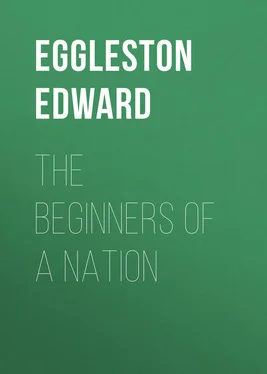Edward Eggleston - The Beginners of a Nation
Здесь есть возможность читать онлайн «Edward Eggleston - The Beginners of a Nation» — ознакомительный отрывок электронной книги совершенно бесплатно, а после прочтения отрывка купить полную версию. В некоторых случаях можно слушать аудио, скачать через торрент в формате fb2 и присутствует краткое содержание. Жанр: История, foreign_antique, foreign_prose, на английском языке. Описание произведения, (предисловие) а так же отзывы посетителей доступны на портале библиотеки ЛибКат.
- Название:The Beginners of a Nation
- Автор:
- Жанр:
- Год:неизвестен
- ISBN:нет данных
- Рейтинг книги:4 / 5. Голосов: 1
-
Избранное:Добавить в избранное
- Отзывы:
-
Ваша оценка:
- 80
- 1
- 2
- 3
- 4
- 5
The Beginners of a Nation: краткое содержание, описание и аннотация
Предлагаем к чтению аннотацию, описание, краткое содержание или предисловие (зависит от того, что написал сам автор книги «The Beginners of a Nation»). Если вы не нашли необходимую информацию о книге — напишите в комментариях, мы постараемся отыскать её.
The Beginners of a Nation — читать онлайн ознакомительный отрывок
Ниже представлен текст книги, разбитый по страницам. Система сохранения места последней прочитанной страницы, позволяет с удобством читать онлайн бесплатно книгу «The Beginners of a Nation», без необходимости каждый раз заново искать на чём Вы остановились. Поставьте закладку, и сможете в любой момент перейти на страницу, на которой закончили чтение.
Интервал:
Закладка:
The first meetings with Indians. They were like people in an enchanted land – all was so new and strange. On the first landing of a small party they had a taste of savage warfare. "At night, when wee were going aboard, there came the savages creeping from the Hills like Beares, with their Bowes in their Mouthes, charged us very desperately, hurt Captain Gabrill Archer in both hands, and a Sayler in two places of the body very dangerous. Percy, in Purchas iv, pp. 1685, 1686. After they had spent their arrowes, and felt the sharpness of our shot, they retired into the Woods with a great noise and so left us."
But the newly arrived did not find all the Indians hostile. The chief of the Rappahannocks came to welcome them, marching at the head of his train, piping on a reed flute, and clad in the fantastic dress of an Indian dandy. He wore a plate of copper on the shorn side of his head. The hair on the other side was wrapped about with deer's hair dyed red, "in the fashion of a rose." Two long feathers "like a pair of horns" were stuck in this rosy crown. His body was stained crimson, his face painted blue and besmeared with some glistering pigment which to the greedy eyes of the English seemed to be silver ore. A. D. 1607. He wore a chain of beads, or wampum, about his neck, and his ears were "all behung with bracelets of pearls." There also depended from each ear a bird's claw set with copper – or "gold," adds the narrator, indulging a delightful dubiety.
Purchas i, 686 and following. During the period of preliminary exploration every trait of savage life was eagerly observed by the English. The costume, the wigwams, and most of all the ingenious weapons of wood and stone, gave delight to the curiosity of the newcomers.
V
Founding of Jamestown. The colonists chose for the site of their town what was then a malarial peninsula; it has since become an island. The place was naturally defended by the river on all sides, except where a narrow stretch of sand made a bridge to the main. 10 10 In 1889, when I visited Jamestown, there was no apparent trace of Sandy Beach which had connected the island with the mainland. This bit of sand, in the antique phrase of one of the early colonists, was "no broader than a man may well quaite a tileshard." Strachey, in Purchas, p. 1752. Jamestown is now a farm; the ruins of the church and many of the tombs in the eighteenth-century churchyard remain; but the upper end of the island is wearing away, and I picked out of the crumbling sand, far from the later burying place, human bones of earlier burials, possibly of the victims of the famines and epidemics. The walls of the magazine had been exposed by erosion. I brought away wrought nails, bits of glass grown iridescent from long burial, and an exploded bombshell of so small a caliber as to mark its antiquity. By the aid of a negro youth living on the farm I found the hearth bricks turned up in various places by the plow, and the arrangement, or rather lack of arrangement, of the town could thus be made out. My guide volunteered the information that Jamestown was "the first place discovered after the Flood." Some drawings made at the time were reproduced with an article on Nathaniel Bacon in the Century Magazine for July, 1890.
Its chief advantage in the eyes of the newcomers was that the deep water near the shore made it possible to moor the ships by merely tying them up to trees on the river bank. Relatyon of the Discovery of our River, Am. Antiq. Soc., iv, 61. Here the settlers planted cotton and orange trees at once, and experimental potatoes, melons, and pumpkins, but they postponed sowing grain until about the first of June in our reckoning.
The winter of misery. They took up their abode in hastily built cabins roofed with sedge or bark, and in ragged tents. The poorer sort were even fain to shelter themselves in mere burrows in the ground. A. D. 1607. Ill provided at the start, the greater part of their food was consumed by the seamen, who lingered to gather comminuted mica for gold. In this hard environment, rent by faction, destitute of a competent leader and of any leader with competent authority, the wonder is that of this little company a single man survived the winter. Purchas, p. 1690. "There never were Englishmen left in any foreign country in such misery as we were in this new-discovered Virginia," says George Percy, brother to the Earl of Northumberland. A pint of worm-eaten barley or wheat was allowed for a day's ration. This was made into pottage and served out at the rate of one small ladleful at each meal. "Our drink was water, our lodgings castles in the air," says Smith. The misery was aggravated by a constant fear of attack from the Indians, who had been repulsed in an energetic assault made soon after the landing of the English. It was necessary for each man to watch every third night "lying on the cold, bare ground," and this exposure in a fever swamp, with the slender allowance of food of bad quality and the brackish river water, brought on swellings, dysenteries, and fevers. Sometimes there were not five men able to bear arms. "If there were any conscience in men," says Percy, "it would make their hearts bleed to hear the pitiful murmurings and outcries of our sick men without relief every day and night for the space of about six weeks." The living were hardly able to bury the dead, whose bodies were "trailed out like dogs." Half of the hundred colonists died, and the survivors were saved by the Indians, who, having got a taste of muskets and cannon in their early attack on Jamestown, now brought in supplies of game, corn, persimmons, and other food, to trade for the novel trinkets of the white men.
VI
Emergence of Captain John Smith. Peril and adversity bring the capable man to the front. The colony proceeded, by means of the technicalities habitually used in those days, to rid itself of its president, Wingfield, a man of good intentions but with no talents suitable to a place of such difficulty. Slowly, by one change and then another, the leadership fell into the hands of Captain John Smith. During the voyage he had drawn upon himself the jealousy of the others, probably by his boastful and self-asserting habit of speech. When the list of councilors, till then kept secret, was opened at Jamestown and his name was found in it, he was promptly excluded by his associates. It was only on the intercession of the clergyman, Hunt, that he was at length admitted to the Council.
His paradoxical character has been much misunderstood. Those who discredit the historical accuracy of Captain Smith's narratives consider his deeds of no value. It is the natural result and retribution of boasting that the real merit of the boaster is cast into the rubbish heap of contempt along with his false pretensions. On the other hand, those who appreciate Smith's services to the colony in its dire extremities believe that the historical authority of such a man must be valid.
His romantic tendencies. His character, double and paradoxical as it is, presents no insoluble enigma if we consider the forces of nature and of habit underlying its manifestations. According to his own highly colored narrative, he had fed his fervid imagination on romances of chivalry. The first natural result in a youth so energetic as he, was that he should set out to emulate the imaginary heroes of whom he had read. It was equally a matter of course that a man of his vanity should exaggerate his own adventures to the size of those that had excited his admiration. The same romantic turn of the imagination that sent him a-wandering after exploits in Flanders and in the wars with the Turks, in Barbary, and in Ireland, made his every adventure seem an exploit of heroic size. Such a man is valuable when boldness and aggressive action are in request; to relate facts where autobiography is involved he is little fitted.
Читать дальшеИнтервал:
Закладка:
Похожие книги на «The Beginners of a Nation»
Представляем Вашему вниманию похожие книги на «The Beginners of a Nation» списком для выбора. Мы отобрали схожую по названию и смыслу литературу в надежде предоставить читателям больше вариантов отыскать новые, интересные, ещё непрочитанные произведения.
Обсуждение, отзывы о книге «The Beginners of a Nation» и просто собственные мнения читателей. Оставьте ваши комментарии, напишите, что Вы думаете о произведении, его смысле или главных героях. Укажите что конкретно понравилось, а что нет, и почему Вы так считаете.












